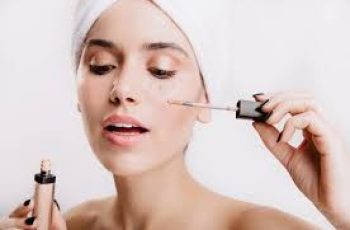
What Is Squalene And What Are Its Skincare Benefits?
If you check the ingredients list of many skincare products, you will likely come across both squalene and squalane.
Though their names sound almost identical, that small difference in spelling actually signals a big difference in their properties and uses.
It’s easy to get confused, but once you understand these two molecules better, the picture becomes much clearer.
So, let’s dive in and explore what squalene really is and why it’s such a valuable ingredient in skincare.
What’s the Difference Between Squalene and Squalane?
Squalene is a natural lipid that is found in our bodies, primarily in the skin. It plays an important role in keeping skin looking youthful, soft, supple, and well-hydrated.
However, like many of the beneficial substances our bodies produce, the levels of squalene start to decrease as we age.
This decline often coincides with dry skin, fine lines, wrinkles, and other signs of skin aging.
The problem with using squalene directly in skincare products is that it is chemically unstable.
It easily oxidizes when exposed to air, which makes it unsuitable for inclusion in most cosmetic formulations.
To solve this issue, squalene undergoes a chemical process called hydrogenation, transforming it into squalane.
Squalane is a more stable and shelf-friendly version of squalene, which can be safely added to skincare products.
A helpful analogy is to think of squalene and squalane as twins. Squalene is the wild one who might party all night, while squalane is the responsible twin who goes to bed early.
Both have their benefits, but squalane is the one you’ll find in most skincare products because it is stable and effective.
Where Does Squalene Come From?
Historically, squalene was sourced from shark liver oil because sharks produce very high amounts of it.
However, this practice raised serious ethical and environmental concerns due to the impact on shark populations and ocean ecosystems.
Fortunately, modern skincare companies now mainly derive squalene from plant-based sources.
Common natural sources include olives, rice bran, and sugarcane, making the ingredient much more sustainable and cruelty-free.
This shift to plant-based squalene has made squalane an even more popular and desirable skincare ingredient.
You can feel good about using products that contain it, knowing they support both your skin and the environment.
Fast Facts About Squalene
Naturally produced by the human body, especially in the skin
Helps maintain skin hydration but decreases after age 30
Traditionally extracted from shark livers but now mostly plant-derived
Unstable in raw form, so it is hydrogenated to form squalane
Squalane is the stable, safe, and effective version found in skincare
Works as a powerful emollient and antioxidant for skin health
What Does Squalene Do for Your Skin?
Squalene is a powerful hydrating booster that enhances your skin’s moisture levels and promotes a radiant, healthy complexion.
Its antioxidant properties help combat free radicals—unstable molecules that cause damage to skin cells and accelerate aging.
By neutralizing these free radicals, squalene protects your skin’s texture, appearance, and overall functionality.
One of the key benefits of squalane-based skincare is its ability to help repair damage caused by sun exposure and environmental aggressors.
It can reduce the appearance of early signs of aging such as fine lines, wrinkles, and loss of firmness by supporting collagen production and maintaining skin elasticity.
Using squalane regularly can help keep your skin looking plump, smooth, and youthful while strengthening its natural barrier.
This protective barrier locks in moisture and shields the skin from irritants and pollutants.
Which Skin Types Can Benefit from Squalene?
One of the best things about squalene and squalane is that they are suitable for almost all skin types.
Dry skin benefits from its deep hydration and nourishing properties, making it an excellent substitute for heavier facial oils.
People with oily or acne-prone skin appreciate that squalane is non-comedogenic, which means it won’t clog pores or trigger breakouts.
Even those with sensitive or reactive skin, including conditions like rosacea and eczema, can benefit from squalane’s anti-inflammatory properties.
It helps soothe irritation and redness while reinforcing the skin’s protective barrier. Since squalane is typically odorless and gentle, it is unlikely to cause irritation.
However, as with any new skincare product, it’s wise to introduce it gradually and watch for any reactions.
How Do You Use Squalene or Squalane in Your Skincare Routine?
Squalane is found in a variety of skincare products, including cleansers, serums, facial oils, and moisturizers.
Because it is gentle and well-tolerated, many people can use multiple squalane-containing products throughout their daily routine.
If you’re concerned about overloading your skin, start with a serum or moisturizer that contains squalane.
These products tend to stay on the skin longer and deliver lasting hydration while helping to restore the skin’s youthful glow.
Applying squalane after cleansing and before heavier creams allows it to lock moisture into your skin effectively.
Squalane pairs well with other hydrating ingredients like hyaluronic acid and ceramides, creating a comprehensive moisture defense system.
Is Squalene Better Than Hyaluronic Acid?
Both squalene (or squalane) and hyaluronic acid are beloved skincare ingredients known for their hydration benefits, but they work differently.
Hyaluronic acid is a humectant, meaning it draws water from the environment and deeper skin layers into the surface, helping skin retain moisture.
However, its ability to hold moisture isn’t long-lasting on its own.
Squalane, on the other hand, works by locking moisture into the skin and strengthening the skin’s barrier.
This allows it to hold hydration for longer periods, helping maintain softness and suppleness throughout the day.
When used together, these ingredients complement each other for optimal skin hydration and protection.
For a deep dive into hyaluronic acid benefits, you can check out skincare blogs dedicated to that ingredient, but rest assured squalane is a fantastic addition to any routine.
Are There Any Risks or Dangers to Using Squalene?
Generally, squalane and squalene are very safe ingredients with low risk of irritation or allergic reactions.
Nonetheless, it’s always advisable to perform a patch test when introducing any new product into your routine, especially if you have sensitive skin.
Apply a small amount of the product to a discreet area and wait 24 hours to see if any redness, itching, or swelling occurs. If no adverse reaction appears, it’s safe to use.
The biggest concern when it comes to squalene is not a risk to your skin but the source of the ingredient.
Always check that the squalene or squalane you purchase is plant-derived rather than extracted from shark liver oil, as the latter raises ethical and environmental issues.
Final Thoughts
Squalene and squalane are remarkable skincare ingredients that provide deep hydration, antioxidant protection, and anti-aging benefits.
Thanks to advancements in sourcing and formulation, you can now enjoy all the perks of this natural molecule in a sustainable and cruelty-free way.
With its versatility and suitability for nearly every skin type, squalane is a wonderful addition to your skincare routine.
It helps keep skin younger-looking, healthier, and beautifully hydrated. While the names may be confusing at first, the results will make it all worthwhile.
So next time you see squalane or squalene on a label, you’ll know exactly what they mean — and how great they are for your skin!


